At Cyculus, delivering high-quality, efficient, and reliable device processing services is at the heart of everything we do. Behind the scenes, a key part of that success is our partnership with Apkudo, the technology provider that powers our fully automated robotic line.
Apkudo doesn’t just deliver the automation — they deliver peace of mind. With two dedicated engineers based full-time on-site at Cyculus, Apkudo ensures that our robotic line operates with maximum uptime, precision, and consistency. These engineers are more than technicians — they are an integral part of our operations team, working side-by-side with us every day to ensure smooth running, rapid troubleshooting, and proactive maintenance.
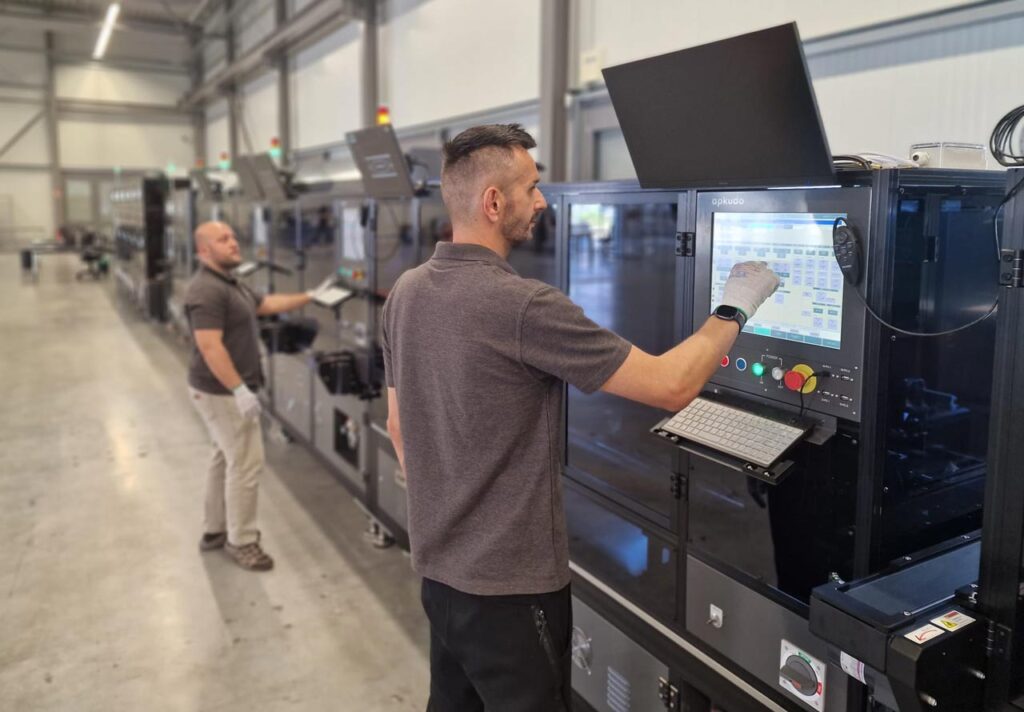
This level of embedded support is a game-changer. It means that Cyculus can focus on what we do best — delivering exceptional service to our customers — while Apkudo ensures the technology behind it all runs like clockwork.
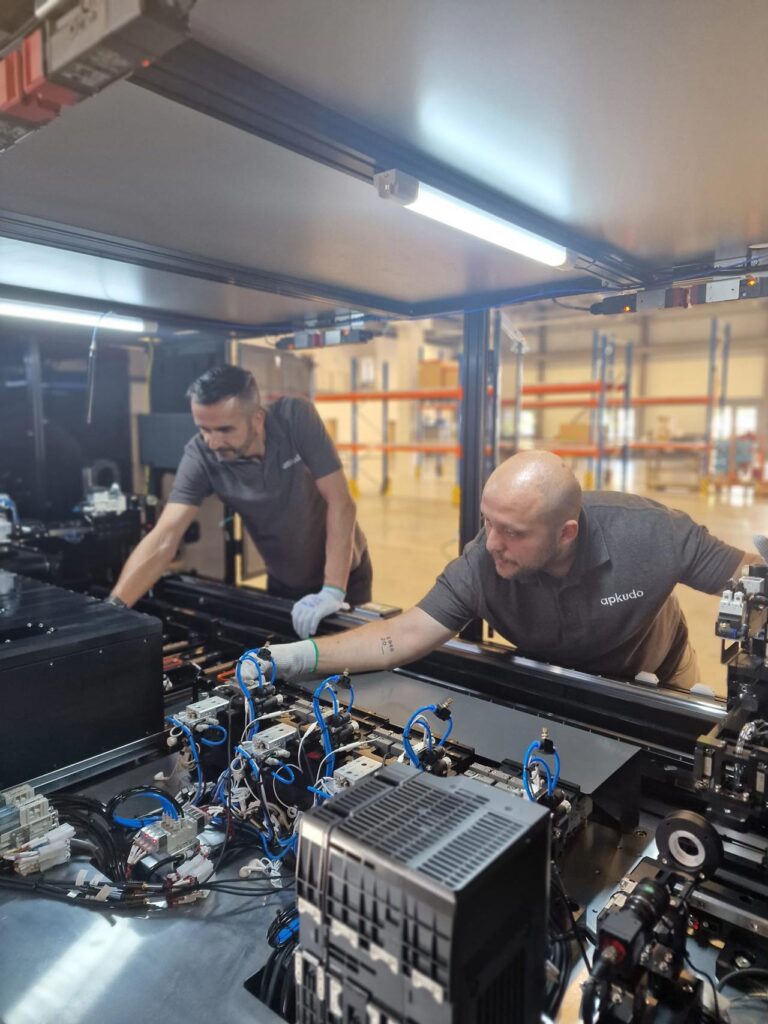
In a high-volume, high-precision environment like ours, even minor disruptions can have a ripple effect. Having Apkudo’s expert engineers on-site ensures that we stay ahead of potential issues and maintain the speed, accuracy, and reliability our clients expect.
It’s a partnership built on trust, expertise, and shared commitment to excellence.
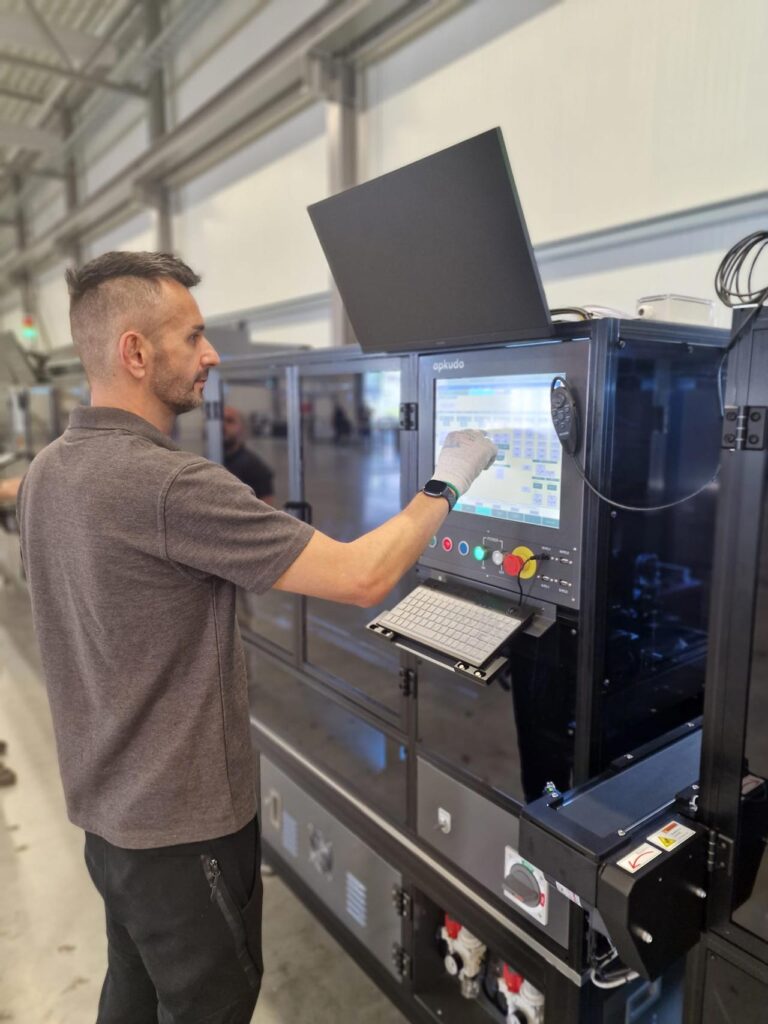
To the Apkudo team — thank you for being such a vital part of the Cyculus journey. Your dedication, technical skill, and collaborative spirit make a real difference every single day.
Here’s to continued innovation, seamless operations, and delivering the best possible outcomes for our customers.
#Automation #EngineeringExcellence #TechPartnership #Apkudo #Cyculus #InnovationInAction #Robotics #DeviceProcessing #OperationalExcellence #Teamwork
Understanding the refurbished phones definition is key to recognising their value. A refurbished phone is a pre-owned smartphone that has been inspected, repaired if necessary, tested, and restored to full working condition before being resold. Refurbished phones are often cleaned, reset to factory settings, and may even come with a warranty—making them a smart, sustainable, and cost-effective alternative to buying new. This refurbished phones definition helps clarify their advantages.
While both are previously owned, there’s a key difference:
Refurbished devices can come from customer returns, demo units, lease trade-ins, or warranty replacements. It’s essential to understand the refurbished phones definition to avoid confusion between used and refurbished options.
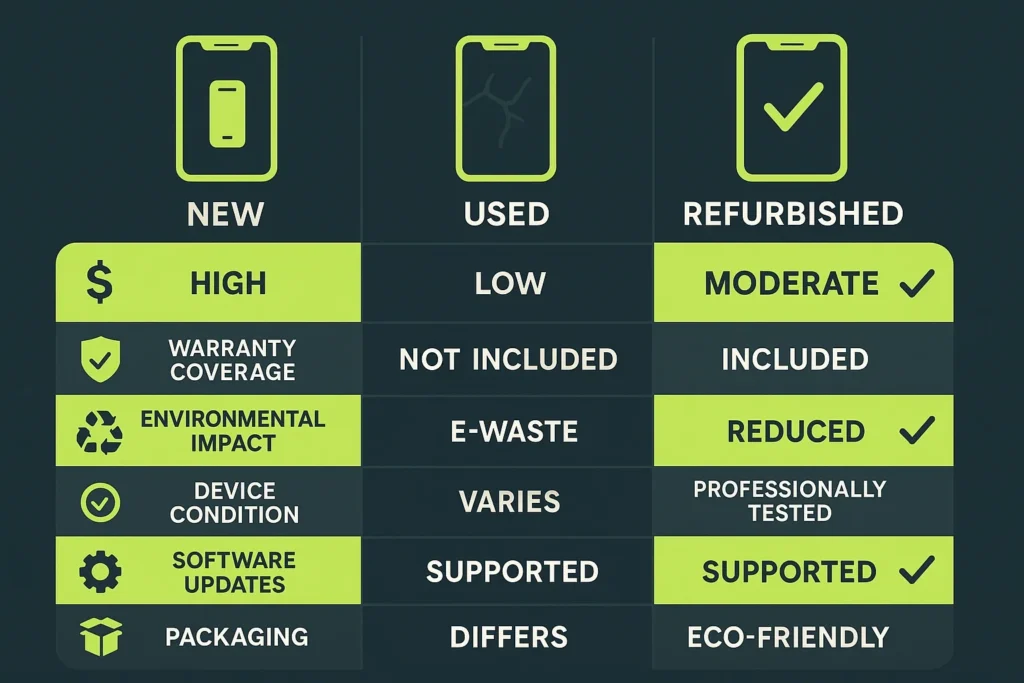
Refurbished phones may be processed by:
At Cyculus, our refurbishment process goes beyond pass/fail checks. Using robotics and AI, each phone is put through over 60 functional tests, cosmetic grading using high-definition imaging, and detailed reporting—offering unmatched consistency and accuracy for the circular economy. This process exemplifies a thorough refurbished phones definition.
Yes—especially when purchased from a certified or authorised refurbisher.
Refurbished phones from reputable sources often:
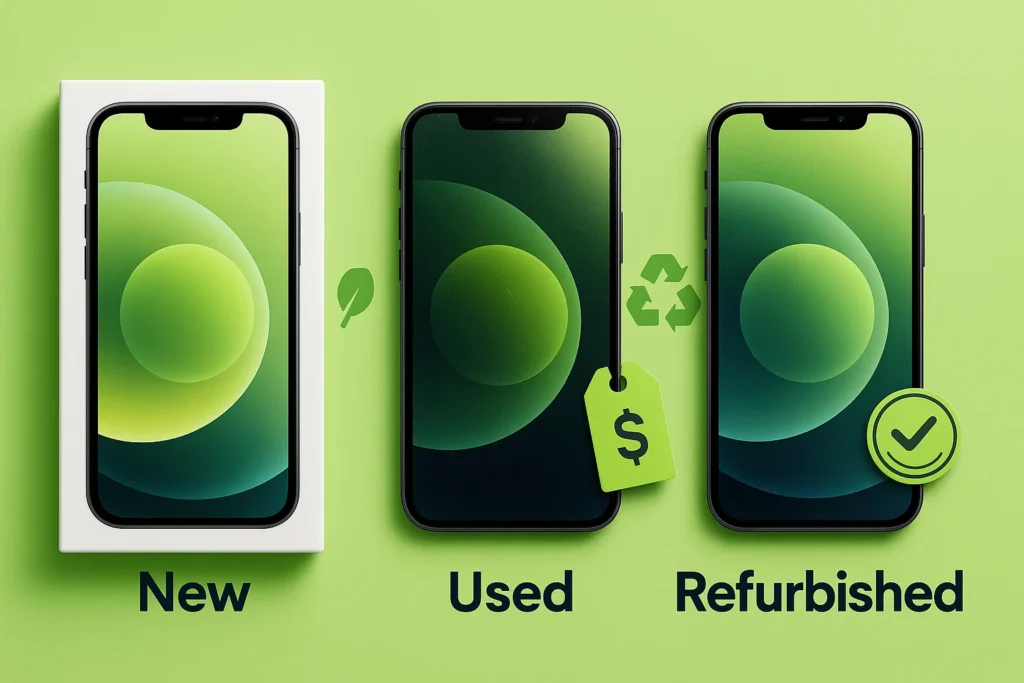
When shopping, check for:
Tip: Ask for a report or certificate like the ones provided by Cyculus that show full functional and cosmetic test results. Understanding the refurbished phones definition will help in making informed decisions.
A refurbished phone is more than just a used device—it’s a tested, certified, and reliable product that helps save money and reduce e-waste. Whether you’re an individual shopper or a business managing device returns, refurbished phones are a smart step toward sustainable tech use. Keep the refurbished phones definition in mind to appreciate their true value.
Want to learn more about how AI and automation are redefining refurbished phones?
Explore cyculus.com – the future of high-quality, precision-graded mobile devices.
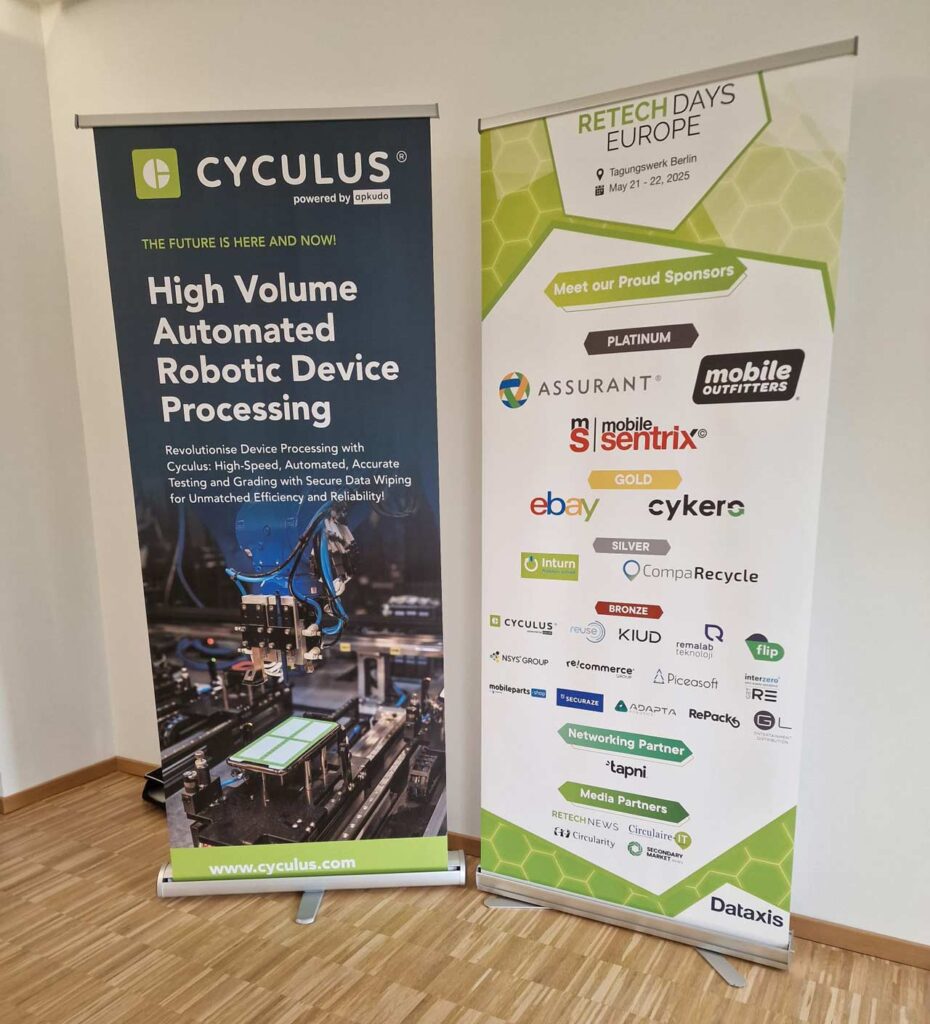
Cyculus proudly took part in Retech Days Europe 2025, joining industry leaders in Berlin to champion the future of the circular economy through automation, innovation, and collaboration. The event brought together top voices in refurbishment, repair, and resale, offering a dynamic stage for exchange, insight, and real progress.
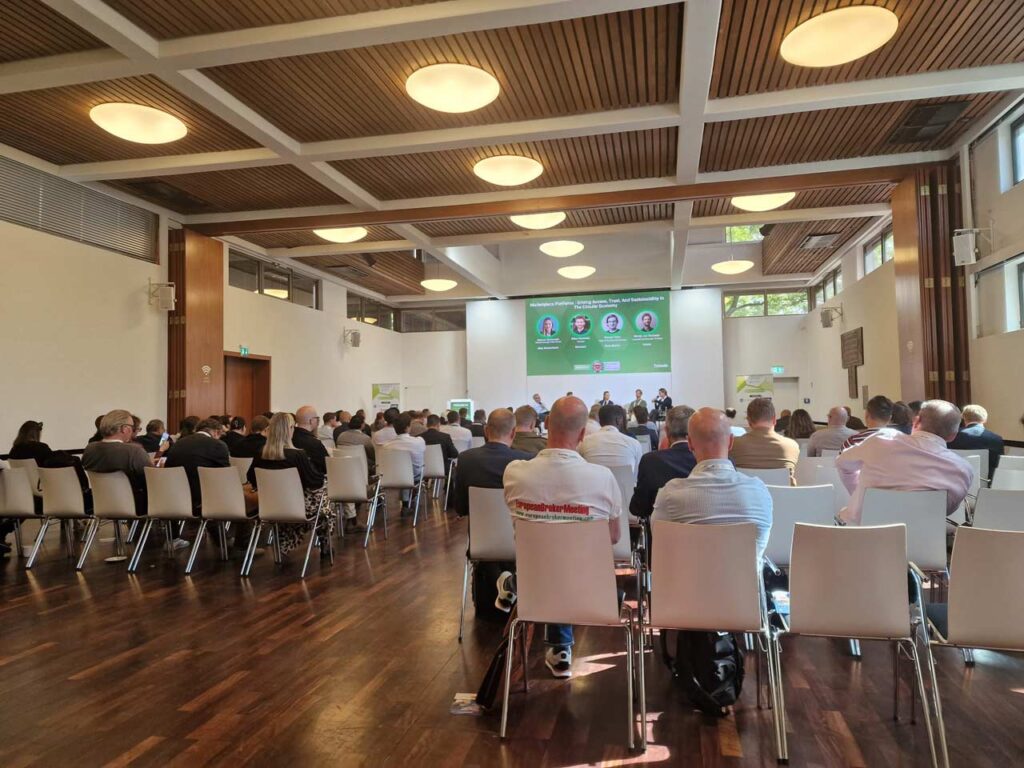
At the heart of the event, our CEO and co-founder, Fergal Donovan, delivered a workshop highlighting the transformative power of AI and robotics in the mobile device lifecycle. With growing pressure on sustainability and rising volumes of used electronics, Fergal laid out the case for Device Processing as a Service (DPaaS), powered by Apkudo, as a scalable and accessible solution for Europe’s fragmented market.
“At Cyculus, we believe automation should be accessible to everyone—not just the big players. Our goal is to democratise high-precision grading and processing, giving smaller businesses the tools they need to thrive in the circular economy,” said Fergal Donovan, CEO of Cyculus Services GmbH.
Throughout the two-day event, we engaged in vital conversations with sustainability pioneers, circular economy experts, and key decision-makers in mobile tech. The interest in automation was clear, and we’re excited to continue building relationships that drive forward-thinking solutions for Europe’s secondary market.
🙏 A huge thank you to the Retech Days organisers and the team at Dataxis for creating such a valuable forum and platform for progress in the repair, refurbishment, and resale ecosystem. We were honoured to be part of it.
👋 See you all next year!
#CircularEconomy #DeviceProcessing #Automation #DPaaS #Sustainability #Cyculus #RetechDaysEurope #Refurbishment #Apkudo #GradingAutomation

At Cyculus, we don’t just keep pace with change — we work to lead it.
Today, we’re proud to share that Cyculus is now an official member of EUREFAS, the European Refurbishment Association.
This move marks an important step in our mission to advance circular and sustainable technology practices, drive innovation, and elevate quality standards in the secondary device market. Through Eurefas, we’re connecting with like-minded leaders to help shape the future of circular electronics across Europe.
We see EUREFAS as a strategic platform to collaborate, advocate, and drive positive impact. Here’s what being part of this network means for Cyculus:
1. Advocacy and Representation
EUREFASu represents the collective voice of Europe’s refurbishment industry.
Joining gives Cyculus a chance to actively participate in policy discussions and champion forward-thinking standards that reflect the values of quality, transparency, and sustainability.
2. Setting and Raising Quality Standards
True innovation demands excellence.
Eurefas helps define quality benchmarks for refurbished products — reinforcing Cyculus’ commitment to delivering high-quality, trusted, and certified device processing services.
3. Networking and Collaboration
Innovation flourishes through collaboration.
As part of EUREFAS, Cyculus has direct access to a dynamic network of industry leaders, creating new opportunities for partnerships, knowledge-sharing, and driving best practices forward.
4. Policy Influence
We believe in shaping the future, not waiting for it.
Through EUREFAS, Cyculus can help influence critical legislation and standards that support the circular economy and the growth of sustainable mobile technology across Europe.
5. Sustainability and Circular Economy Leadership
Sustainability is hardwired into everything we do.
Joining EUREFAS amplifies our mission to extend device life, reduce waste, and build smarter supply chains — accelerating progress towards a truly circular economy.
6. Greater Visibility Across Europe
Membership with EUREFAS strengthens Cyculus’ position as a trusted, independent processor, offering new opportunities to reach customers and partners who share our vision for sustainable growth.
“Joining EUREFAS is a natural step for Cyculus. We are proud to stand alongside other leaders who believe that sustainable practices and innovation can — and must — go hand in hand. Together, we can help shape the next chapter for the circular economy in Europe.”
– Fergal Donovan, CEO, Cyculus Services GmbH
Becoming part of EUREFAS isn’t just about strengthening our own position.
It’s about working together to build a future where technology, sustainability, and business growth align — where circular practices aren’t the exception, but the expectation.
We’re excited to contribute to EUREFAS’ work and to continue pushing boundaries in the refurbishment and device processing space.
The future of circular electronics is here — and Cyculus is proud to be helping shape it. #CircularEconomy
In the US, 85% of pre-owned phones are processed using automation, while in Europe, that number is just 10-15%. But why does this gap exist, and how is Cyculus changing the landscape?
In a recent Apkudo podcast, our very own Fergal Donovan, CEO and co-founder of Cyculus, shares how Device Processing as a Service (DPaaS) is transforming the European mobile device market. With over 25 years of industry experience at companies like Motorola, Brightpoint, and PCS Wireless, Donovan explains how AI-driven automation and robotics are making device processing faster, more consistent, and more sustainable.
Unlike the US, Europe has a fragmented business landscape, with 600+ businesses across 28 countries handling pre-owned device processing. This fragmentation has made automation adoption slow, leaving many businesses relying on manual grading and refurbishment, which is:
Inconsistent – Human grading leads to errors and disputes.
Inefficient – Slower processing times increase costs.
Limited – Smaller businesses struggle to access advanced automation technology.
To bridge this gap, Cyculus introduced DPaaS—a scalable, automation-powered solution that removes the need for businesses to invest in costly robotics while delivering high-precision testing and grading.
To ensure the highest level of device grading accuracy, consistency, and efficiency, Cyculus partnered with Apkudo, leveraging their AI-powered processing technology, which offers:
Controlled testing environments for standardised device assessment.
High-resolution imaging & AI-driven grading for precise cosmetic inspections.
Automated functional testing to detect defects faster and more accurately than manual methods.
Scalability, allowing businesses to process large volumes without human error.
By eliminating subjectivity and inefficiency, Cyculus delivers industry-leading processing speed, accuracy, and resale readiness—bringing European businesses up to global standards.
Beyond efficiency, sustainability is a driving force behind Cyculus. Operating from a solar-powered facility, Cyculus integrates:
Energy-efficient heat pump technology for sustainable operations.
Circular supply chain improvements, reducing return rates & enhancing device quality.
Right-to-repair advocacy, supporting a greener, longer-lasting device ecosystem.
With upcoming European regulations enforcing stricter CE branding and USB-C adoption, sustainable automation will be critical for businesses wanting to stay ahead.
To further establish trust, transparency, and quality in device processing, Cyculus is working towards key industry certifications, including:
ISO Standards
Ecovadis Certification
B Corp Potential
Right-to-Repair Industry Memberships
With strong demand for DPaaS across sectors including insurance, operators, distributors, traders, and resellers, Cyculus is poised to reshape Europe’s secondary mobile market.
#Automation #DeviceProcessing #AI #CircularEconomy #Sustainability #TechInnovation
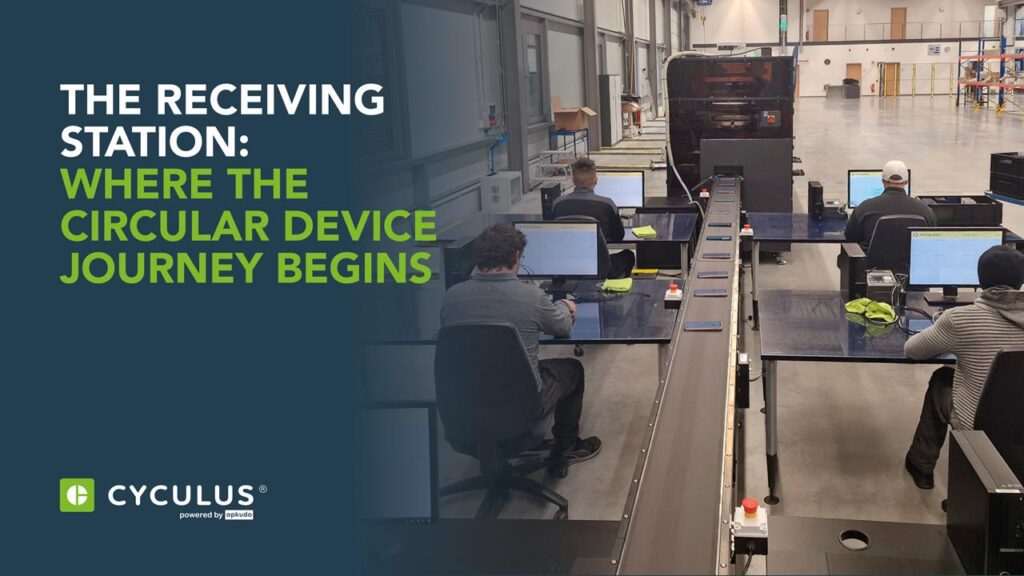
Before a device can enter the AI-driven processing system, it must undergo a rigorous preparation process to ensure accuracy, security, and efficiency. At Cyculus, powered by Apkudo’s cutting-edge automation, the Receiving Station is where every device is verified, cleaned, and prepared to ensure a smooth transition into automated testing and grading.
By systematically removing potential processing obstacles, verifying security credentials, and ensuring compliance with global standards, we eliminate errors, inconsistencies, and security risks before the device moves forward in our Device Processing as a Service (DPaaS) model.
At Cyculus, every device undergoes a structured preparation process to ensure clean, verifiable, and automation-ready devices before testing.
🔹 Any remaining customer data is securely deleted from both the device and memory card, ensuring complete data privacy compliance.
🔹 Devices that fail data wipe verification are flagged for further inspection or secure disposal.
🔹 All screen protectors and stickers are removed to prevent interference with AI-driven grading and testing.
🔹 This ensures the device accurately reflects its true cosmetic condition, avoiding false results.
🔹 Devices with broken screens or damaged back covers are flagged for manual processing and will not be entered into automated testing.
🔹 This prevents machine errors and ensures only structurally intact devices enter robotic grading.
🔹 Each device is checked against the GSMA global blacklist to detect:
✔️ Reported stolen devices
✔️ Devices with outstanding financial obligations
🔹 Any device failing GSMA verification is automatically quarantined from resale.
🔹 The Apkudo Testing App is loaded onto the device to enable real-time diagnostics and ensure compatibility with automated functional tests.
🔹 This prepares the device for seamless integration into AI-powered processing.
🔹 If a SIM card is found, it is removed and securely destroyed to ensure:
✔️ No residual customer data
✔️ No network conflicts during testing
🔹 The system runs a full account lock check, detecting:
✔️ Apple ID locks (iCloud Activation Lock)
✔️ Google Account locks (FRP – Factory Reset Protection)
✔️ MDM (Mobile Device Management) restrictions
🔹 Locked devices are flagged for manual review, preventing resale issues.
Once a device passes the Receiving Station, it moves to the Cleaning Cell, where Apkudo’s advanced dry ice technology removes dust, adhesives, and contaminants in seconds—preparing the device for precise AI-driven grading.
#CircularEconomy #DeviceProcessing #Automation #Apkudo #GSMA #AIGrading #Sustainability